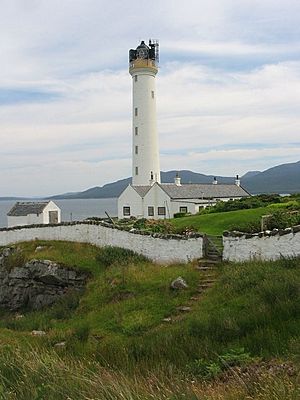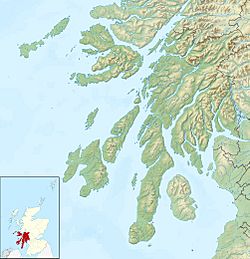Ruvaal Lighthouse facts for kids
 |
|
| Ruvaal Lighthouse | |
|
|
|
| Location | Islay Inner Hebrides Scotland |
|---|---|
| Coordinates | 55°56′11″N 6°07′25″W / 55.93635°N 6.123483°W |
| Year first constructed | 1859 |
| Tower shape | cylindrical tower with balcony and lantern |
| Markings / pattern | white tower, black lantern, ochre trim |
| Height | 34 metres (112 ft) |
| Focal height | 45 metres (148 ft) |
| Range | 19 nautical miles (35 km; 22 mi) |
| Characteristic | Fl (3) W 15s |
| Admiralty number | A4236 |
| NGA number | 114-4208 |
The Ruvaal Lighthouse is an old but still working lighthouse. It stands on the north-eastern tip of Islay, an island off the west coast of Scotland. This lighthouse helps guide ships safely. It marks the entrance to the Sound of Islay. This is a narrow waterway between Islay and the nearby island of Jura. The Northern Lighthouse Board operates it. They manage many important lights around Scotland.
Contents
Building the Ruvaal Lighthouse
Why Was This Lighthouse Needed?
People realized a lighthouse was needed here a long time ago. As early as 1835, experts said lights were important. They wanted to warn ships about hidden rocks. These rocks were called the Neva Rocks. A tall and strong lighthouse was the best solution.
Who Designed It?
The lighthouse was designed by two brothers. Their names were David and Thomas Stevenson. They came from a famous family of lighthouse builders. Their father, Robert Stevenson, was also a well-known engineer. This family built many lighthouses in Scotland.
When Was It Built?
Work on the lighthouse began in 1857. It took two years to build. The lighthouse was finished in 1859. It cost about £6,500 back then. That would be a lot more money today!
What Does It Look Like?
The Ruvaal Lighthouse is a tall, round tower. It is 34 metres (112 ft) high. The tower is painted white. It has a balcony and a lamp room at the top. There are 158 steps inside to reach the very top. The parts around the windows and doors are made of sandstone.
Getting Supplies to the Lighthouse
The lighthouse is in a very remote spot. It was always hard to get supplies there. It was also difficult for new keepers to arrive. In the 1980s, helicopters started helping. They made it much easier to bring things. Helicopters also helped build an electricity line in 1981. Sadly, one helicopter crashed during this work. Luckily, the pilot survived.
How the Lighthouse Changed
With electricity, the lighthouse got a new electric light in 1982. The next year, it became automated. This means it could run by itself. Lighthouse keepers were no longer needed. Their homes were sold and are now private houses. The Northern Lighthouse Board still looks after the tower and its light.
What Happened to the Old Light?
The original big lens from the lighthouse was saved. It is called a Fresnel lens. Now, you can see it in a garden. It is part of a display at Colonsay House. This house is on the nearby island of Colonsay.
Protecting This Historic Building
The entire lighthouse station is important. This includes the tower, the old keeper's homes, and the walls. They are all protected as a "category B listed building." This means they are special and must be preserved.
Images for kids
 | Aaron Henry |
 | T. R. M. Howard |
 | Jesse Jackson |



